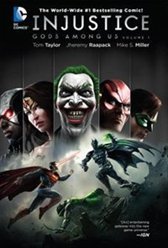 Superman and Lois are in love, married, and expecting their first child. It's beautiful and short-lived. The Joker brings a quick end to Lois and Superman's happy ending, killing Lois and destroying Metropolis. Superman goes berserk. He takes swift and fatal revenge on the Joker. If it had ended there his actins might have been if not acceptable, at least understandable but it doesn't end there. Superman decides he wants to make sure no one else has to suffer the pain he is going through. He decides he will do whatever it takes to bring peace to the world. Sounds great right?
Superman and Lois are in love, married, and expecting their first child. It's beautiful and short-lived. The Joker brings a quick end to Lois and Superman's happy ending, killing Lois and destroying Metropolis. Superman goes berserk. He takes swift and fatal revenge on the Joker. If it had ended there his actins might have been if not acceptable, at least understandable but it doesn't end there. Superman decides he wants to make sure no one else has to suffer the pain he is going through. He decides he will do whatever it takes to bring peace to the world. Sounds great right? It is not great. Batman sees the situation for what it is immediately. Superman's intentions may be good but his actions are not. His peace is brought about and enforced through violence. People who disagree with Superman and his friends are labeled as terrorists. Luckily humanity has Batman on its side.
It is not great. Batman sees the situation for what it is immediately. Superman's intentions may be good but his actions are not. His peace is brought about and enforced through violence. People who disagree with Superman and his friends are labeled as terrorists. Luckily humanity has Batman on its side.I can't remember what attracted me to this series. Maybe it was the artwork or that it was a complete series by the time I came across it, which meant no waiting to see how the story ended. (This is only Year One, there are four more years left for me to read.) Whatever it was I wasn't expecting anything more than a fun superhero story. Did I mention that this series is based on a video game?
The best stories make a reader think. Injustice made me think. Like many I've wondered why Batman never puts a permanent end to the Joker and his deadly antics. Here we get an answer. Batman is not a murderer. Batman understands that he has to stick to a moral code or he would be no better and no different than the criminals he fights. Superman doesn't get that, at least not yet. But again the series isn't over yet so maybe he will eventually. I am eager to find out.
